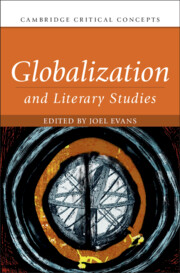Book contents
- Globalization and Literary Studies
- Cambridge Critical Concepts
- Globalization and Literary Studies
- Copyright page
- Contents
- Figures
- Tables
- Contributors
- Acknowledgements
- Introduction
- Part I Origins
- Chapter 1 The Ecology of Globalization
- Chapter 2 Forms of Premodern Literary Circulation
- Chapter 3 The End of History
- Chapter 4 Translation
- Chapter 5 Empire
- Part II Development
- Part III Application
- References
- Index
Chapter 2 - Forms of Premodern Literary Circulation
from Part I - Origins
Published online by Cambridge University Press: 01 April 2022
- Globalization and Literary Studies
- Cambridge Critical Concepts
- Globalization and Literary Studies
- Copyright page
- Contents
- Figures
- Tables
- Contributors
- Acknowledgements
- Introduction
- Part I Origins
- Chapter 1 The Ecology of Globalization
- Chapter 2 Forms of Premodern Literary Circulation
- Chapter 3 The End of History
- Chapter 4 Translation
- Chapter 5 Empire
- Part II Development
- Part III Application
- References
- Index
Summary
Premodern literary circulation resembles premodern trade in material goods in that it covers the planet less completely than does the modern world-system. Instead, different kinds of literary texts circulated on different scales and in different networks. Short, simple, easily translated and adapted texts such as beast fables and frame-tales, travelled the most widely and crossed the most linguistic borders. Religious scripture, and other highly valued texts, also travelled great distances, thanks to the huge resources occasionally invested in their transmission and translation. By contrast, denser patterns of literary circulation took place in smaller, more clearly-defined, regions. A key index of such regions in pre-modern literature is the adaptation of specific poetic forms, tied to the distinctive prosodic qualities of a major literary language, and requiring sustained investment and effort to carry over successfully into new languages, typically vernaculars culturally dependent to some degree on the source language. This phenomenon is traced through the gradual circulation of two poetic forms, the Arabic qasida and the sonnet.
- Type
- Chapter
- Information
- Globalization and Literary Studies , pp. 35 - 50Publisher: Cambridge University PressPrint publication year: 2022

